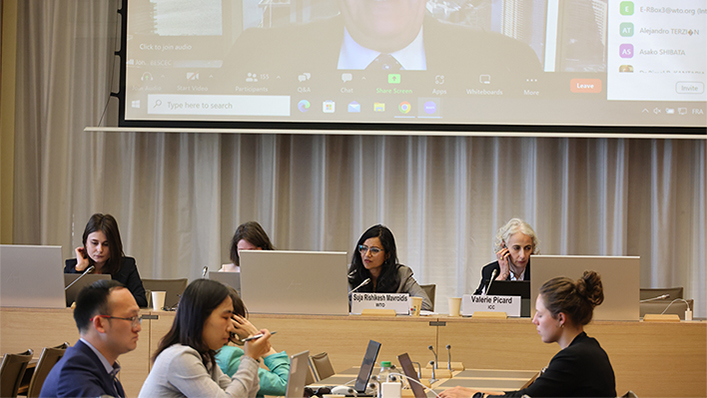
The event, moderated by Suja Rishikesh Mavroidis, Director of the Market Access Division, highlighted how the COVID-19 pandemic lockdowns compelled businesses and organisations to move many of their functions online and to accelerate their digital transformations. These included processes related to the movement of goods across borders and dealing with customs issues. Participants also looked at how this digital transformation has affected trade in goods and discussed whether trade has become as a result more efficient, safe and sustainable.
John Bescec, Director of Customs and Trade Affairs at Microsoft and Chair of the Global Customs and Trade Facilitation Commission at the ICC, explained how the pace of digitalization has increased significantly around the globe since the pandemic and stressed how digital solutions were the tools that enabled trade to continue.
From a significant reliance upon paper and manual processes that slowed down trade during COVID-19, countries and companies transitioned to updated digital-based operating models to handle modern post-pandemic world trade. Further digitalizing process and incorporating modern technologies such as artificial intelligence (AI) machine learning will reduce risks in trade and will allow better targeting to reduce intentional and unintentional fraud. The reality is humans can no longer process the amount of data generated in international trade, said Mr Bescec.
Asako Shibata, Global Trade Compliance Manager at Bell Textron Inc and Vice-Chair of the ICC Global Customs and Trade Facilitation Commission, provided an example of the changes in the way trade is conducted as a result of the pandemic. She spoke of one particular facet of Japanese business culture, which is the custom of stamping trade paperwork with a personal seal. Despite being deeply rooted, since the pandemic the private sector and customs office have moved to a paperless operation, having a positive impact on trade.
Dr Bimal R. Kantaria, Managing Director at ELGON Kenya Limited and Chairman of Agriculture Sector Network (ASNET) in Kenya, spoke of a revolutionized business environment stemming from the quick technological adaptation of companies to the reality imposed by the pandemic, reducing the cost of doing business and significantly improving efficiency. This revolution is speeding up, offering endless business and economic opportunities, he said.
He pointed to the huge jump in internet speeds in Africa and to the success of platforms such as M-PESA (a mobile phone-based money transfer service) as an example of how technology has leaped forward in recent years, allowing companies to double in size in a matter of years just by engaging online and trading worldwide. He also underlined the impact of the government’s decision to be fully online for administrative procedures, such as passport applications, visas, etc.
Alejandro Terzián, Head of the Center of Excellence for International Trade and Customs Compliance at Bayer Latam (Argentina), and Vice-Chair of the ICC Global Customs and Trade Facilitation Commission, referred to the pharmaceutical industry in Latin America. Despite the pandemic, operational levels were not only maintained, but there was an acceleration and easing of import clearance at customs, he said.
However, Mr Terzián indicated that there has been a recent regression to pre-pandemic levels and suggested that the digitization of PDF customs documents be re-authorised with an ex-post control — the performance evaluation process after the activity or project have been fully completed — for those operators who are safe and reliable. He also underlined the considerable progress in electronic phytosanitary certificates (ePhyto) in several countries in the region, which have been of significant help to international trade.
Panelists addressed other issues key to the evolution of trading goods in the digital area, including the role of blockchain in managing data privacy, and the importance of the interaction between public officials and professionals in the implementation trade facilitation agreements. They also addressed the contribution of digitalization to environment sustainability and the role of the WTO in the digital data revolution.
The event was closed by Andrew Wilson, ICC Global Policy Director, who stressed the importance of the exchange of information to learn what is happening on the ground, particularly for policymakers. He said ICC is intensively working with businesses and industry associations across the supply chain to look at the adoption of trusted technologies, interoperable systems and common digital standards for trade documents.
Underscoring that more effective border processes translate into more environment-friendly trade and economic gains through lower trade costs, Mr Wilson said fully embracing the digital era requires a collaborative journey, especially when it comes to market access. It is key that the private sector works hand in hand with government partners as only through collective efforts will it be possible to face the challenges ahead, he said.
Share
Reach us to explore global export and import deals